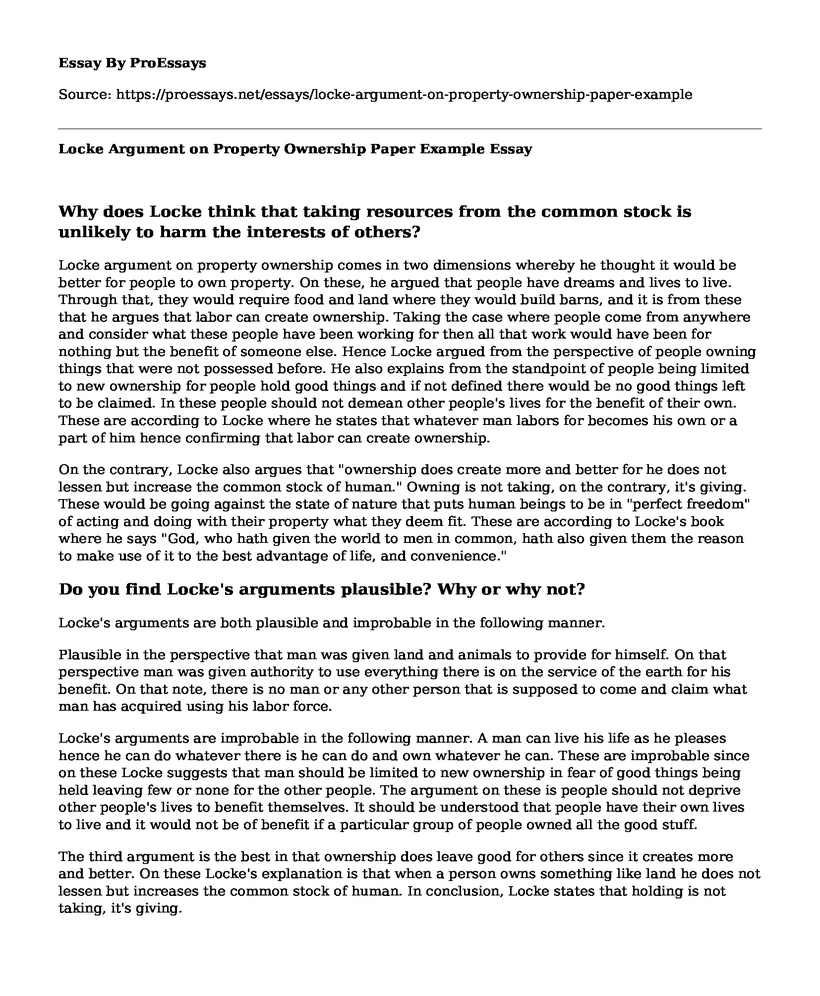Why does Locke think that taking resources from the common stock is unlikely to harm the interests of others?
Locke argument on property ownership comes in two dimensions whereby he thought it would be better for people to own property. On these, he argued that people have dreams and lives to live. Through that, they would require food and land where they would build barns, and it is from these that he argues that labor can create ownership. Taking the case where people come from anywhere and consider what these people have been working for then all that work would have been for nothing but the benefit of someone else. Hence Locke argued from the perspective of people owning things that were not possessed before. He also explains from the standpoint of people being limited to new ownership for people hold good things and if not defined there would be no good things left to be claimed. In these people should not demean other people's lives for the benefit of their own. These are according to Locke where he states that whatever man labors for becomes his own or a part of him hence confirming that labor can create ownership.
On the contrary, Locke also argues that "ownership does create more and better for he does not lessen but increase the common stock of human." Owning is not taking, on the contrary, it's giving. These would be going against the state of nature that puts human beings to be in "perfect freedom" of acting and doing with their property what they deem fit. These are according to Locke's book where he says "God, who hath given the world to men in common, hath also given them the reason to make use of it to the best advantage of life, and convenience."
Do you find Locke's arguments plausible? Why or why not?
Locke's arguments are both plausible and improbable in the following manner.
Plausible in the perspective that man was given land and animals to provide for himself. On that perspective man was given authority to use everything there is on the service of the earth for his benefit. On that note, there is no man or any other person that is supposed to come and claim what man has acquired using his labor force.
Locke's arguments are improbable in the following manner. A man can live his life as he pleases hence he can do whatever there is he can do and own whatever he can. These are improbable since on these Locke suggests that man should be limited to new ownership in fear of good things being held leaving few or none for the other people. The argument on these is people should not deprive other people's lives to benefit themselves. It should be understood that people have their own lives to live and it would not be of benefit if a particular group of people owned all the good stuff.
The third argument is the best in that ownership does leave good for others since it creates more and better. On these Locke's explanation is that when a person owns something like land he does not lessen but increases the common stock of human. In conclusion, Locke states that holding is not taking, it's giving.
Works Cited
Locke, John, and Esmond Samuel De Beer. The Correspondence of John Locke. Vol. 8. Oxford: Clarendon Press, 1976.
Tully, James. A discourse on property: John Locke and his adversaries. Cambridge University Press, 1982.
Locke, John. "Of property." Theoretical and Empirical Studies of Rights. Routledge, 2017. 13-27.
Cite this page
Locke Argument on Property Ownership Paper Example. (2022, Jul 03). Retrieved from https://proessays.net/essays/locke-argument-on-property-ownership-paper-example
If you are the original author of this essay and no longer wish to have it published on the ProEssays website, please click below to request its removal:
- Indian Rupee Essay
- Essay on Criminal Justice System: Program Analysis and Policy Evaluation
- Historical Definition of Human Rights Essay
- Relative Size and Growth Rate of Construction Industry Paper Example
- Diversion Programs Essay Example
- Email Scams and Phishing Scams - Research Paper
- A Prosecutor's Vision for a Better Justice System - Essay Sample







